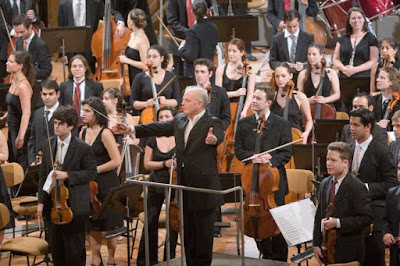Jacqueline du Pré and
Daniel Barenboim in the 1960s. They married in 1967. Ms. du Pré was forced to
stop playing in 1973 — age 28 — because of multiple sclerosis. She died 14
years later. Credit Jack Robinson/Hulton Archive, via Getty Images
LONDON — The British
cellist Jacqueline du Pré was in her teens when she was sent to the Swiss
mountain resort of Zermatt for a master class with Pablo Casals, one of the
20th century’s great cello virtuosos.
“I still have at home a
photograph of her with Pablo Casals when she was 15 years old,” said the
conductor and pianist Daniel Barenboim, who would become Ms. du Pré’s husband
and musical partner. “He signed his name underneath his picture,” Mr. Barenboim
recalled. “And underneath Jacqueline, he wrote: ‘Genius.’”
Ms. du Pré went on to
become one of the world’s top cellists. Yet just over a decade after that
picture was taken, she learned she had multiple sclerosis. She stopped playing
in 1973 — age 28 — and died 14 years later.
On Oct. 28 and 29, Mr.
Barenboim is marking the 30th anniversary of her death with two concerts at the
Royal Festival Hall in London in aid of the Multiple Sclerosis Society, a
British charity.
“She was not just another
wonderful cellist, she was not just a wonderful musician; she was really
unique,” said Mr. Barenboim. “Music was not a profession for her. Music was a
way of living, a way of life.”
Daniel Barenboim’s
West-Eastern Divan Orchestra Delivers AUG. 20, 2014
Frank Gehry and Daniel
Barenboim on Their New Concert Hall in Berlin MARCH 3, 2017
Mr. Barenboim acknowledged
that Ms. du Pré’s knowledge of music theory “left a bit to be desired, to be
quite objective. But she more than made up for that with an extraordinary
intuition and sensitivity. I have never encountered somebody like this.”
“The greatest musical joy
was to play together with her,” he added. “I think we complemented each other.
She had an abandon that was very contagious, and I loved it.”
The tribute concert will be
performed by the West-Eastern Divan Orchestra, an ensemble co-founded by Mr.
Barenboim. It will open with Richard Strauss’s “Don Quixote.” The cello soloist
will be Kian Soltani.
“If this was the last
concert I would ever play, I would die happy,” Mr. Soltani, 25, said. He
remembered being overwhelmed as a teenager when he first saw a video of Ms. du
Pré. “It was like I was watching some old master, although she was in this
young body,” he said. “In 300 years, people will still be talking about her.”
Ms. du Pre’s legacy owes
much to the fact that she grew up in the television age. Her smiling, telegenic
face and passionate playing became familiar to audiences far and wide, thanks
to recorded performances and documentaries.
Her uniqueness “really
projected itself to the audiences. It projected itself even more so on the
videos, because she had such a physical way of playing the cello,” Mr.
Barenboim said. A deaf person watching them “would immediately know what a high
degree of intensity there was in her,” he added.
Mr. Barenboim, center, with
the West-Eastern Divan Orchestra in 2006. He said playing with Ms. du Pré was
the ”greatest musical joy.” Credit Luis Castilla
Ms. du Pré also set an
example for other British musicians. “She was like a goddess for us,” said
Steven Isserlis, a renowned cellist. “She was just this force on stage, and
that of course always stays with you.”
What also made her stand
out was her destiny — “so tragic that it doubly fixed her in our hearts,” Mr.
Isserlis said. “She’s an icon twice over.”
Ms. du Pré was born in
Oxford, England, in January 1945. At the age of 4, she heard the cello on a
radio program about orchestral instruments, and told her parents she would like
to “have one of those.” Backed by her mother — an accomplished pianist and
teacher — she began learning at age 5.
At 11, while studying at
the Guildhall School of Music and Drama in London, Ms. du Pré won the first of
many prizes. She made her debut at Wigmore Hall in the British capital at 16.
“She was already a sensation,” recalled the pianist Stephen Kovacevich, who was
there. “I was just blown away.” The two later became close friends, playing and
recording together………………
https://www.nytimes.com/2017/10/27/arts/music/jacqueline-du-pre-cello-concert.html?rref=collection%2Ftimestopic%2FClassical%20Music&action=click&contentCollection=timestopics®ion=stream&module=stream_unit&version=latest&contentPlacement=5&pgtype=collection


No hay comentarios:
Publicar un comentario